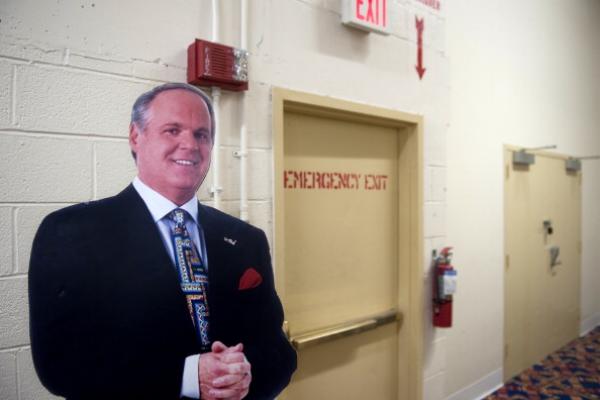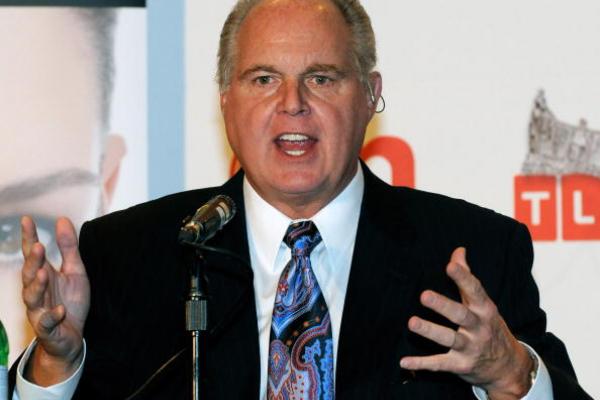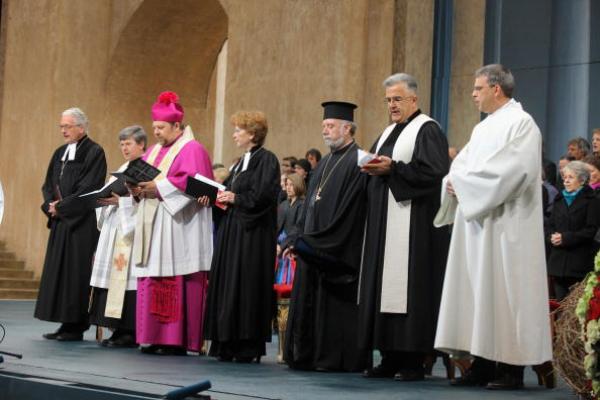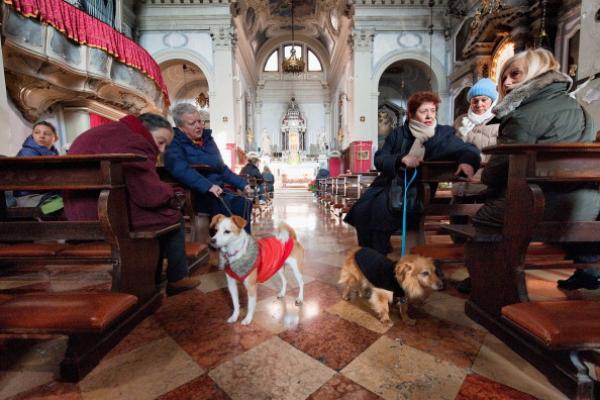Tony Perkins, President of the Family Research Council, appeared on Martin Bashir last week to condemn Rush Limbaugh’s words against Georgetown Law Student, Sandra Fluke.
Bashir asked:
"Mr. Perkins, I’ve found this whole controversy extremely disturbing and it seems almost impossible to find a Republican who unequivocally without conditions condemns what’s been said. Now you are a family man, you’re a committed Christian you play an important role in conservative politics will you for the benefit of our broadcast clearly and categorically denounce what Rush Limbaugh said? "
Perkins response:
"I disagree that because there is a double standard that somehow defends what was said. I do think there is a double standard but that doesn’t defend attacking an individual.
"I think we need to engage in civic -- or civil discussion. I don’t think there’s any room in this process for calling people derogatory names. I think what Rush Limbaugh did by calling this young woman, regardless of her political views, regardless of what she was advocating for, calling her derogatory names. I disagree with her position. I think what she said was off base, what she was advocating for was off base, but I think Rush Limbaugh was wrong in calling her what he did."
Good for him. As Bashir pointed out at the beginning of his program, many conservatives are often hesitant to criticize someone like Limbaugh for fear of on air retribution. Speaking out could cause lost support and donations.
The news spread through the city of Suleimaniya so quickly. Within an hour, Kurdish news outlets let the locals know that something bad had happened. From there, it moved even more quickly across the ocean.
By the evening of March 1, I was shocked to read it in my Manitoba prairie city’s newspaper: “Iraqi student kills American teacher in Christian school murder-suicide.“
Along with the bare facts, the questions and rumours arose. Why had the 18-year-old Kurdish boy carried a handgun to class in a Christian school in Suleimaniya and shot his teacher to death?
Was it the result of religious disagreement?
Was there some other kind of conflict between the two of them?
How could a handgun have entered the classroom?
Some our Kurdish partners called a meeting to see if some sort of action should take place. None of us had known either the teacher or the boy. Reports said that this type of shooting was not so unusual, that it happens in the United States all the time. But violence like this had never happened in a school in Kurdish Northern Iraq. Kurds were reeling and asking themselves what is it about their country that allows people to settle differences with a gun in a classroom?
As a progressive Christian in my mid-20s, it'd be safe to bet I might be a fan of Donald Miller. And I am. Miller's Blue Like Jazz and Searching For God Knows What are among the books that have significantly affected my faith journey.
And, like many others in my demographic, I met the news of an adaptation of Blue Like Jazz with both hope and apprehension. Like Miller himself, “at first, I didn’t understand how it could be a movie. I couldn’t see it on a screen.”
My own anxieties about a big-screen adaptation fell into two categories. First Jazz is, for all intents and purposes, a memoir. And memoirs — or the biopics they often become onscreen — are, in my opinion, rarely great films. They are usually little more than a path to the Oscars for actors who are pining after an ego-boost (but I guess that’s another story).
What saves Blue Like Jazz, thankfully, is that it is a memoir with a difference. It isn’t a rose-tinted, romanticized account of some historical or celebrated figure. It is the memoir of someone who is very much like me — just a little bit funnier. That’s where the appeal comes from and I'd expect that's what will make Blue Like Jazz (the film) a success both here and abroad.
In an apparent bid to add an erudite contribution to our public discourse, Rush Limbaugh called a Georgetown law student a "slut" and a "prostitute" for testifying before Congress in favor of the Obama administration's mandate that employers cover contraception in their health insurance plans.
After a considerable public outcry, a number of sponsors have abandoned Limbaugh, causing him to issue what resembled a public apology. But Limbaugh also heard more than a few "amens" from people who considered difference of opinion a sufficient justification for publicly defaming the young woman.
Maybe I'm expecting way too much from talk radio, but don't we deserve better from our public discourse?
At the heart of this debate over contraception is a conflict between religious rights and social obligation -- one we've had to navigate numerous times in our nation's history.
It's never been easy for us to determine the boundaries between individual right to unencumbered belief and competing responsibility to civic need. But it certainly doesn't help us work through the difficulties when pundits resort to name-calling and complexities are dissolved into bumper-sticker sound bites.
To talk carefully about this tough issue requires that we take seriously the claim from some Catholics that a requirement to finance contraception represents a fundamental violation of convictions about when life begins and what makes sex a moral good. Yet we also need to take just as seriously the moral value that others place on the right of access to basic health services, and the public good that comes from including contraception in our definition of basic health care.
For years, advocates for greater unity among Christian churches have wrung their hands amid talk of an "ecumenical winter."
But now, 10 years after leaders took the first steps toward forming the broad-based group Christian Churches Together in the USA, some have hopes that U.S. churches may be entering a new season of closer relations.
At a recent CCT meeting in Memphis, Tenn., 85 Christians -- Catholic, Protestant and Orthodox, white and nonwhite -- made pilgrimages to historic sites of the civil rights movement. They also made plans to use next year's 50th anniversary of the Rev. Martin Luther King Jr.'s Letter from a Birmingham Jail to pursue anti-poverty projects with houses of worship unlike their own.
"I would like to think of it as an ecumenical spring and that we do not yet know what will break forth," said the Rev. Stephen J. Sidorak Jr., ecumenical staff officer of the United Methodist Church.
"I think that there's the potential for the ecumenical movement to be more alive than it's ever been because it will be more inclusive."
In many ways, the movement that has grappled with theological differences, leadership struggles, finances -- and even what to call itself -- is in the midst of major down-sizing that they hope will lead to wider engagement:
When doomsday prophet Harold Camping conceded last week that his failed May 21 end-of-the-world prediction was "incorrect and sinful," the average American probably shrugged, perhaps even snickered.
But for Bart Centre, Camping's mea culpa could have real impact on his bottom line.
The co-owner of a business that promises to care for the pets of Christians who are swept up in the Rapture saw a jump in business last year ahead of Camping's prediction.
"It was obviously a mistake," said Centre, who runs Eternal Earth-Bound Pets from New Hampshire. "I'm just sorry that he's not going to be doing any more predictions because it's good for business."
If you've ever seen or heard Kristin Chenoweth sing, you know she is a pint-sized ray of sunshine. She oozes joy and grace and love for her audience from every pore of her 4-foot-11-inch frame. Plus, girlfriend has a spot-on, finely calibrated sense of comic timing. (I dare you to watch her perform and not at least crack a smile. She is enchanting, her natural ebullience utterly infectious.)
What you may not know is that Chenoweth, 44, is a Christian. Born and raised in the Southern Baptist tradition where she accepted Jesus into her heart at the tender age of 8, "Cheno," as she is known to her legion devoted fans, now describes herself as a nondenominational "non-judgmental, liberal Christian." Her devotion to Jesus and His Way is something she's never been shy about, both before and after she took Broadway by storm in her early 20s.
“I'm sick of people who've never been to church telling me that church is full of hypocrites, and people who've never read the Bible telling me that it's baloney," she wrote in her 2009 memoir, A Little Bit Wicked. "I'm a very controversial figure in the Christian world. I don't believe if you're gay or you have a drink or you dance, you're going to hell. I don't think that's the kind of God we have. The Pat Robertsons and Jerry Falwells of the world are scary. I want to be a Christian like Christ — loving and accepting of other people."
BRIDGEPORT, Conn. — The Catholic bishop leading the push against the White House's contraception mandate says the bishops hope to restart contentious talks with the Obama administration, but cautioned that church leaders "have gotten mixed signals from the administration" and the situation "is very fluid."
Bishop William E. Lori of Bridgeport, Conn., who chairs the religious liberty committee of the U.S. Conference of Catholic Bishops, told Religion News Service that Catholics have to stay united if the hierarchy is to have any chance of prevailing in negotiations with the White House.
Ever since President Obama bowed to growing pressure and shifted the mandate to provide contraception mandate to insurance companies and away from religious employers, the White House has been hosting talks with various religious groups about a plan to modify the regulation.
Catholic institutions like hospitals, universities and social service agencies are most directly affected by the regulation because they are the biggest faith-based employers. They have also been much more amenable to the Obama accommodation than have the bishops.
Many bishops are upset with Catholic groups that have dealt independently with the administration, and some have also accused the administration of trying to divide the church.
A Catholic priest who allegedly denied Communion to a lesbian at her mother's funeral has been put on leave pending an investigation of unrelated "intimidating behavior toward parish staff and others," the Archdiocese of Washington said.
The Rev. Marcel Guarnizo, a priest from Moscow who has been serving in the archdiocese since last March, lost his assignment at St. John Neumann Catholic Church in Gaithersburg, Md., on Friday (March 9).
Guarnizo made headlines when Barbara Johnson, a lesbian attending her mother's funeral at the church, said he denied her Communion. At the time, the archdiocese said "issues regarding the suitability of an individual to receive Communion should be addressed by the priest with that person in a private, pastoral setting."
Guarnizo's removal is related to other issues and not the Communion incident, a diocesan spokeswoman said. The archdiocese said an official had received "credible allegations" of Guarnizo's behavior that were considered "incompatible with proper priestly ministry."
24-hour "penguin cam" at SeaWorld, world dictators depicted in cake, public art collaboration "Before I die...", fun finds for children of the 80s and 90s, dogs catch pythons in Everglades, unsual protest at a Radiohead show, and the stars of Despicable Me sing a song about bananas.







